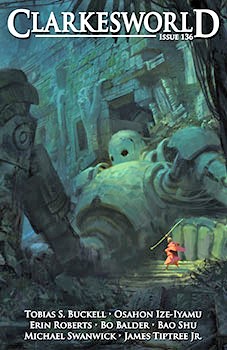 Clarkesworld #136, January 2018
Clarkesworld #136, January 2018
“A World to Die For” by Tobias Buckell
Reviewed by Rebecca DeVendra
“A World to Die For” by Tobias Buckell takes us to a dystopian Chicago through the eyes of outriders outfitted in scavenged gear and wearing respirators. The heroine finds herself in a situation of mistaken identity, but plays along for a lucrative reward. The story evokes a Mad Max aesthetic while being fresh and hopeful, a testament to Buckell’s readable and beautiful prose.
“Say it Low, Then Loud” by Osahon Ize-Iyamu explores the existential musings of Efosa, who thinks in absolute values and wishes cultures were so easily categorized. He’s haunted by whispers that tell him he’s being used to win a war. The story is a deep reflection on the relationship mathematics has to space, and that abstract concepts do not have amoral consequences. The action of the story is all off-page, which causes some pacing problems, but that doesn’t dilute the concept. The writing is very intelligent and the story worth thinking over for a long time after.
“Sour Milk Girls” by Erin Roberts is about foster children analyzing a newcomer. Each of the children have trauma that they do not remember; the Agency takes that away from them so that their can integrate the memories into their adult lives later. The prose is very interesting and readable as the characters propel the narrative forward. The ending is sweet but not surprising, so this ends up being a good comfort read.
“A Cigarette Burn in Your Memeory” by Bo Balder is about Gouda, a private investigator searching for missing persons. Gouda’s life seems mundane enough but an ominous cloud hangs over the story as it goes on, the unknown raising the stakes. The world is post climate apocalypse: no Internet, limited goods and travel. And people are going missing…or are they just being forgotten? This is a poignant tale with a haunting climax, even if it does have a slow and somewhat befuddling start.
“The Lighthouse Girl” by Bao Shu, translated by Andy Dudak, is a stream of consciousness epistolary. The protagonist is a young girl detailing her day. She slowly realizes that her life is not as it’s presented, that her parents might not really be hers. The story turns into one about transformation with some fascinating body horror. The ending is truly unique and the writing is gripping.
Rebecca DeVendra is a figure artist and speculative fiction writer living in Boston. Her fiction can be found at Starship Sofa. She’s also a mom to three cacophonous, early-rising children. She’s probably in her pajamas, but she has an emergency collar shirt for video calls. Check out her blog.